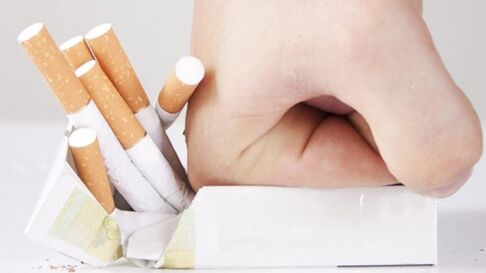| non-smoking days |
body changes |
Physiological perception |
the feeling experienced |
|---|
| 1 |
Carbon dioxide is removed and oxygen levels within cells return to normal |
Slight dizziness, anxiety, loss of appetite, slight weakness |
Full of pride in actions, full of joy and confidence in successful results |
| 2 |
The beginning of bronchial cleaning. Wet cough occurs, expectorant and poisonous |
The sense of taste is enhanced, but the appetite is reduced. Shortness of breath, worsening cough, moderate abdominal pain, frequent urination, worsening sleep |
Enthusiastic mood remains, but irritability and nervousness develop |
| 3 |
Normal blood supply to the organs and mucous membranes of the gastrointestinal tract begins to be restored. Nicotine addiction reduced |
Tastes have changed. I want something sweet. Appetite returned. Increased dizziness, nausea, burping, and heartburn.Papules and flaky areas appear on the skin. Unpleasant sensations, ringing and tinnitus in the heart area |
Joy disappears and irritation and anger increase. All I could think about was how to smoke. Nothing makes me happy and I can't focus. Light and intermittent sleep |
| 4 |
Complete normalization of blood supply |
As the pressure increases, the noise in the ears increases. The intestines stop working and constipation begins. Urination returned to normal.Feeling like there is a lump in the throat and the cough gets worse. Slight swelling of the face, fingers, and ears |
Absence remains, but mood improves. Moods can range from euphoria to depression. light sleep |
| 5 |
Bronchial purification continues, lungs connected |
Changes in taste. A lump formed in my throat. When you cough, thick, black mucus comes out |
Condition worsens, thoughts of collapse occur |
| 6 |
Cleansing of the bronchial tubes ends and toxins are excreted from the lungs through mucus |
Worsening of the condition: excessive sweating, hand tremors, whole body tremors, loss of appetite, nausea, thirst, and increased urination.Cough worsens, phlegm is dark, thick, and contains blood streaks |
Irritability, aggression, and tearfulness return. The thought of smoking becomes reality and becomes irresistible |
| 7 |
Clean your body thoroughly. The liver kicks in and begins producing natural nicotine |
The cough and feeling of coma remain. The intestines start working. Increased appetite, but large or fatty foods can cause burning sensation and heartburn |
No emotion whatsoever, completely empty. Without the physical craving for cigarettes, the desire to perform the ritual remains |
| 8 |
sense of smell restored |
Increased appetite and feeling of enjoying food. Slight dizziness and slight drop in blood pressure |
Aggression and hysteria are reduced and you can find activities you enjoy. No one has a lasting attachment to cigarettes. But there is a sense of longing and loss. Sleep is completely disrupted |
| 9 |
Normalizes the work of enzymes in the body. Lungs remain open |
There may be mild pain in the abdomen and bowel disturbances are observed. Increased appetite. Dizziness worsens.The immune system is completely suppressed. Possible infection with infectious diseases |
The smell of cigarettes is disgusting. There is a feeling of complete loss |
| 10 |
Immune system kicks in |
The cough does not subside and phlegm continues to flow out. When you cough, you cough up soft, light-colored lumps with a bad odor |
Being around a smoker is difficult. Motivation disappears and need for support from loved ones increases |
| eleven |
The circulatory system is renewed and strengthened |
Increased appetite, dizziness, internal tremors, headache |
The return of hysteria and aggression. Intolerable, unbearable urge to smoke |
| 12 |
The immune system returns to normal. Skin color restored |
Coughing decreases, complexion improves, and intestinal function returns to normal |
The hysteria continues. Urgent need for support and understanding from loved ones |
| 13 |
The recovery process is taking place at the cellular level |
General weakness, heaviness in the occipital region, changes in pressure. Normalization of nervous system functions |
Desire to smoke out of curiosity |
| 14 |
Organization has been restored |
crucial moment. The cough has lessened. Yellow pigment disappears on fingers |
I don't want to smoke at all. People worry about accidentally falling and take pride in being able to exit. |
























